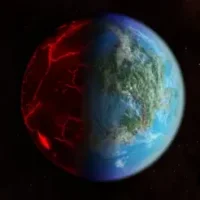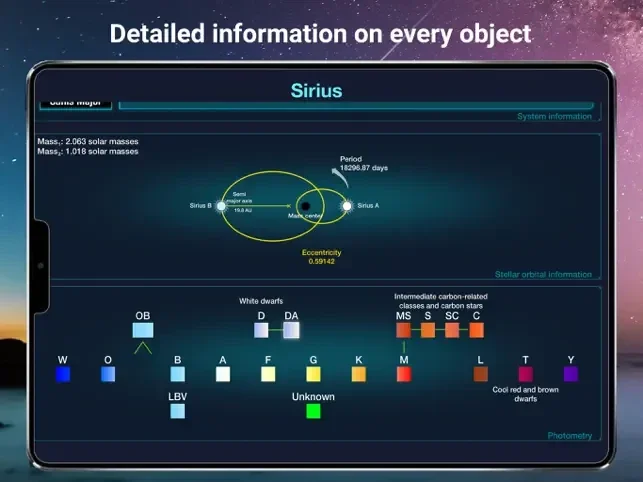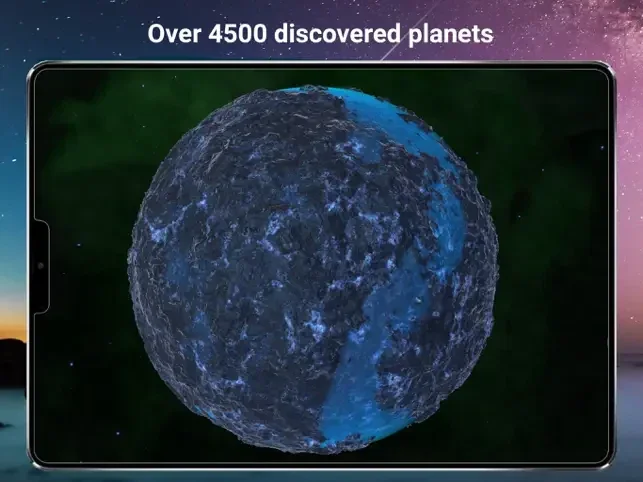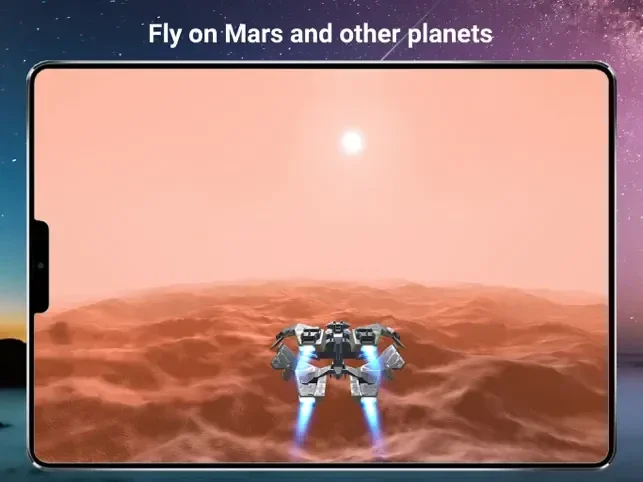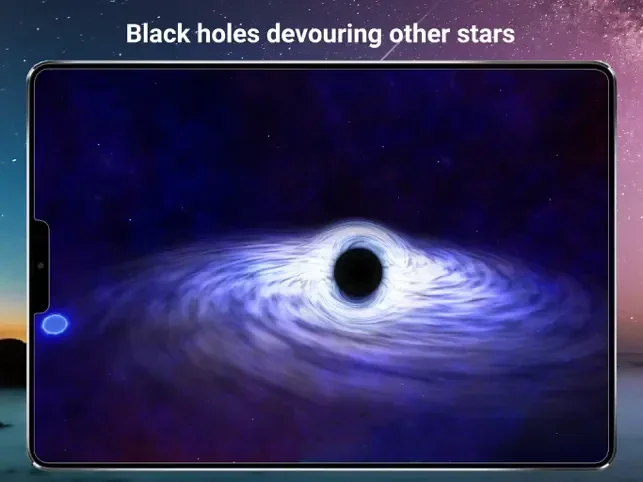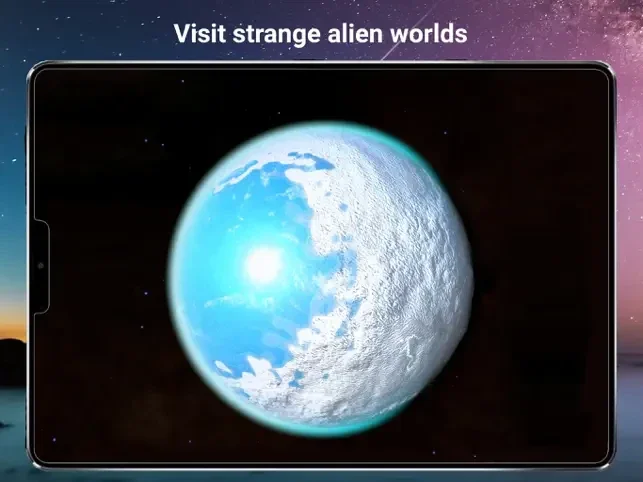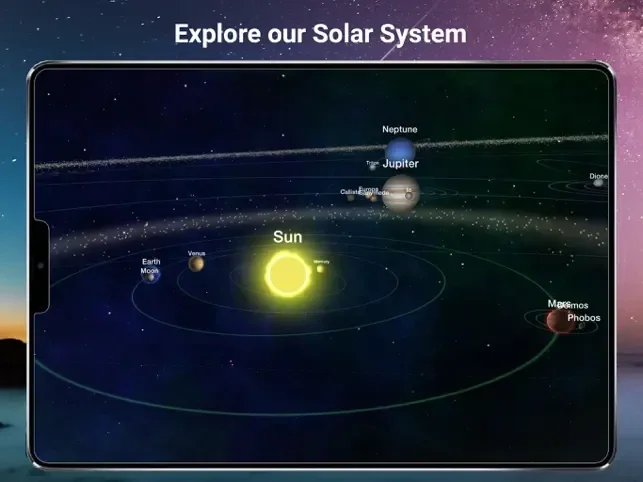
Son Versiyon
Versiyon
3.2.5
3.2.5
Güncelleme
Nisan 10, 2023
Nisan 10, 2023
Geliştirici
Universe 3D Space & Astronomy
Universe 3D Space & Astronomy
Kategoriler
Eğitim
Eğitim
Platformlar
iOS
iOS
Dosya Boyutu
246.8 MB
246.8 MB
İndirmeler
0
0
Lisans
Free
Free
Rapor Et
Problem Bildir
Problem Bildir
Stars and Planetslication Hakkında
Stars and Planets is an interactive map of our galaxy. Explore the planets and satellites of our Solar System from the comfort of your spaceship. Fly through the atmosphere of Mars and many other planets.Take a thrilling ride through space and visit strange alien star systems, newly discovered exoplanets, asteroid belts, black holes and pulsars.
Do you want to travel through space with a warp engine? Play with the orbital motions of star systems, planets and satellites. Ever wondered how far from us are the stars you see in the night sky? Stars and Planets is a space model of the universe.
This interactive 3D map is excellent for teachers to use for instruction, and it is a great astronomy resource for students to explore the Milky Way galaxy and space as they learn more about the universe we live in. Available in over 100 languages!
Features
▶ Almost 4.5 million stars, over 4500 exoplanets, 200 circumstellar disks, 39 black holes, 11 magnetars, around 2500 pulsars and 152 satellites in this simulated view of our Universe
▶ Catalogs are updated daily from multiple sources, without needing to update the app. Whenever NASA & ESA James Webb Space Telescope - JWST - will find new celestial bodies, they will be included automatically
▶ 3D representations of all star systems and their orbits in space
▶ black holes in binary systems, including the famous Cygnus X-1 and the Great Annihilator (the only binary system with a black hole and a pulsar)
▶ pulsar exoplanets - the first type of exoplanet ever discovered beyond our solar system, orbiting the extremely dense core of a massive star that exploded as a supernova
▶ magnetars, a special and rare type of neutron star
▶ Search for stars, planets, moons, black holes and neutron stars by a wide range of parameters: name, type, system type, constellation, catalog, star type (color)
An internet connection is necessary to access the online stellar database as well as the wiki information. A subset of the database can be queried offline including planetary and orbital data.
Data imported from various sources including: SIMBAD, The Extrasolar Planets Encyclopedia, NASA Exoplanet Archive, Planet Habitability Laboratory
This interactive 3D map is excellent for teachers to use for instruction, and it is a great astronomy resource for students to explore the Milky Way galaxy and space as they learn more about the universe we live in. Available in over 100 languages!
Features
▶ Almost 4.5 million stars, over 4500 exoplanets, 200 circumstellar disks, 39 black holes, 11 magnetars, around 2500 pulsars and 152 satellites in this simulated view of our Universe
▶ Catalogs are updated daily from multiple sources, without needing to update the app. Whenever NASA & ESA James Webb Space Telescope - JWST - will find new celestial bodies, they will be included automatically
▶ 3D representations of all star systems and their orbits in space
▶ black holes in binary systems, including the famous Cygnus X-1 and the Great Annihilator (the only binary system with a black hole and a pulsar)
▶ pulsar exoplanets - the first type of exoplanet ever discovered beyond our solar system, orbiting the extremely dense core of a massive star that exploded as a supernova
▶ magnetars, a special and rare type of neutron star
▶ Search for stars, planets, moons, black holes and neutron stars by a wide range of parameters: name, type, system type, constellation, catalog, star type (color)
An internet connection is necessary to access the online stellar database as well as the wiki information. A subset of the database can be queried offline including planetary and orbital data.
Data imported from various sources including: SIMBAD, The Extrasolar Planets Encyclopedia, NASA Exoplanet Archive, Planet Habitability Laboratory
Uygulamayı Puanla
Yorum & Görüş Ekle
Kullanıcı Yorumları
0 yoruma göre
Henüz yorum yapılmadı.
Yorumlar moderasyon kontrolünden sonra yayınlanmaktadır.
Daha Fazla »










Popüler Uygulamalar

LivU - Canlı Video Sohbet- Livu APK Hileli Versiyon - Livu Altın Hileli MOD APK İndirLIVU Team

Stick War: LegacyMax Games Studios

eFootball 2023 APK Mod İndir - eFootball 2023 APK Sınırsız Para HileliKONAMI

Brawl Stars Mod Apk İndir - Brawl Stars Elmas Hileli Mod Son SürümSupercell

Aşk hikayesi oyunları ChatLinxWebelinx Games

Free FireGarena International I
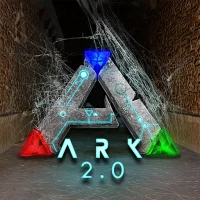
ARK: Survival EvolvedStudio Wildcard

UT Mobile Card CreatorScout App

FIFA Apk Mod - Fifa APK Para Hileli Mod İndirELECTRONIC ARTS

Yalla Mod APK İndir - Ücretsiz Altın Kazanma HileliYalla Technology FZ-LLC
Daha Fazla »










Editör'ün Seçimi
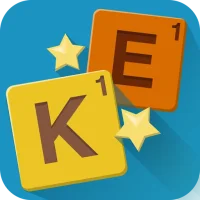
Kelimelik Mod APK İndirHe2 Apps

FIFA Apk Mod - Fifa APK Para Hileli Mod İndirELECTRONIC ARTS

Yalla Mod APK İndir - Ücretsiz Altın Kazanma HileliYalla Technology FZ-LLC

Tango Mod APK İndir - TANGO BEDAVA JETON HİLELİ SON SÜRÜM İNDİRTango

eFootball 2023 APK Mod İndir - eFootball 2023 APK Sınırsız Para HileliKONAMI

LivU - Canlı Video Sohbet- Livu APK Hileli Versiyon - Livu Altın Hileli MOD APK İndirLIVU Team

Brawl Stars Mod Apk İndir - Brawl Stars Elmas Hileli Mod Son SürümSupercell

World War PolygonAlda Games

WhatsApp MessengerWhatsApp LLC

Photo Retouch-Object RemovalPimple Eraser&Blemish Remover
